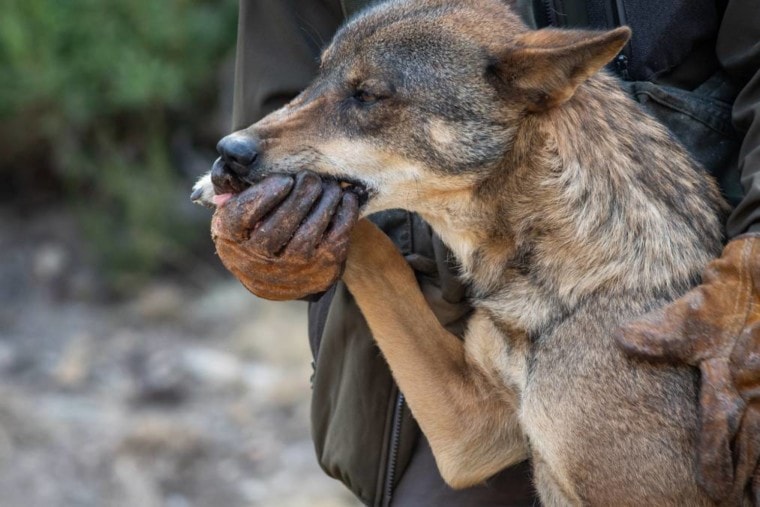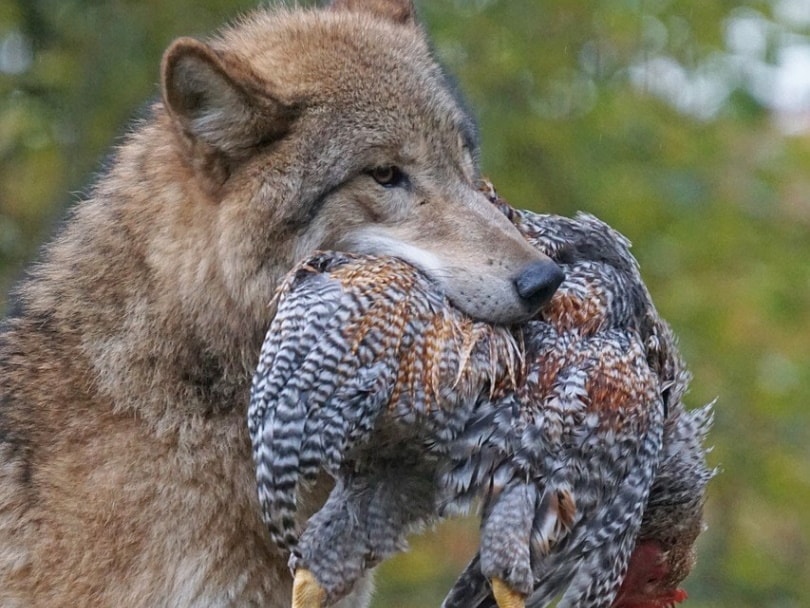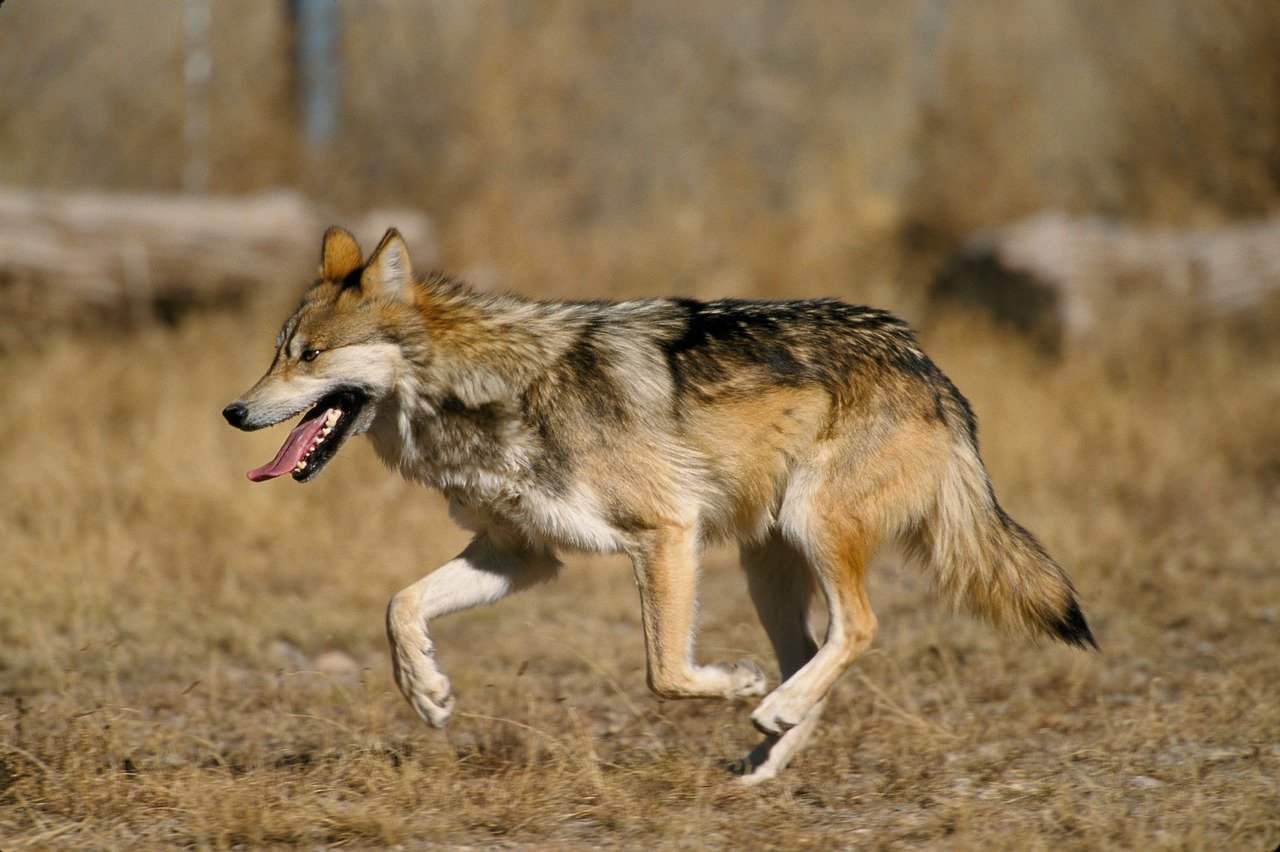Can Wolves Eat Dog Food? Is It Good for Them?

We’ve all watched commercials on television or on our social media apps that claim certain brands of dog foods are better for your pets due to them being more like what a wolf would eat in the wild. Yes, our dogs come from the same lineage as wolves but are the foods the same? Could you feed the dog food we buy at the local pet store to a wolf and it be healthy? That’s what we’re here to answer.
Dogs are indeed descendants of wolves. According to experts, today’s dogs come from gray wolves to be exact. That doesn’t mean that several years of interbreeding and attempts to make designer dogs haven’t changed things a bit. Wolves and dogs don’t need the same types of nutrition. Will regular store-bought dog food such as kibble keep a wolf healthy? The answer is no.
Let’s take a look at wolves and their nutritional requirements. You’ll see that the foods you feed your domesticated pet aren’t up to par for keeping one of nature’s most beautiful, and wild, animals healthy.

The Differences Between Wolves and Dogs
When standing a full-grown wolf beside a dog one of the first things you’ll notice is a difference in size. We mentioned that dogs are a descendant of the wolf, but through the years of domestication things changed quite a bit. Most breeds of dogs we bring into our homes are much smaller than wolves in the wild. This difference in size doesn’t stop at body structure though. You’ll also note that wolves have larger teeth than most dogs and can take down large prey.
Wolves are hunters. They don’t rely on humans to provide them with food like domesticated animals. Instead, they hunt in packs. When they take down an animal, they are known to eat large amounts of food to sustain them until more can be found. Due to them needing to survive on so little, mostly due to loss of territory, they can go through great periods without a food source. Could you imagine the dog curled on the foot of your bed doing that?
What Do Wolves Eat in the Wild?

Wolves are known as one of the great carnivores roaming the forest. A wolf’s normal diet consists of animals they find around them. Deer, elk, moose, and even wild hogs are primary food sources for wolves. They prefer ungulates or hooved animals when possible but aren’t afraid to scavenge when need be. When larger prey isn’t available, a pack of wolves will hunt squirrels, rabbits, or even catch fish to keep themselves fed. If food sources become a big issue for a pack, wolves will revert to digging in people’s trash, killing livestock, eating berries and other fruits, or eating grass. Like many wild animals, they do what is needed to survive.
Wolves are feast or famine eaters. Simply put, when they can find large prey animals for food, they eat quite a bit. Unfortunately, this isn’t always the case for these animals. When food sources are scarce, their bodies go into famine mode. This is when they survive on their body’s stored fats and proteins from when they feasted well. When a food source is available again, wolves can eat well and regain the weight they’ve lost while searching for a food source.

Understanding What a Wolf Needs
As you can see from their primary food sources, wolves depend on quite a bit of protein and fat to survive. Their prey, other animals, are full of these nutrients. This is what allows wolves to sustain themselves when a hunt is out of the question. But, wolves need other things as well. While a wolf may not eat fruits and vegetables with each meal, that doesn’t mean their bodies don’t need the vitamins and minerals they provide. This may leave you wondering where wolves get these important additions to their diets. They find them in the animals they choose as their prey.
While a wolf may not make fruits and veggies the main source of food, the deer, moose, and elk they hunt do. With carnivores like wolves, not much is wasted after a hunt. When a wolf feeds on an animal’s organs, they are also getting the nutrients that the animal has ingested. This keeps the balance of nutrients their bodies need to survive.
Wolves and Dog Food

Many dog foods out there claim to provide your pup with the foods wolves eat in the wild. In most situations, that’s not the case. Most dog foods feature beef, pork, chicken, and often fish as their main source of protein. While a hungry wolf isn’t going to be picky about what they eat, this isn’t the protein they are most used to. That doesn’t mean the proteins, fats, and carbs in regular dog food are necessarily bad for them. The issue comes from another source, the starches.
Over the years of their domestication, dogs have developed the ability to digest starches in their diet. They have more copies of the genes needed to do this. Wolves only have 2 copies of this gene. What does this mean for a wolf given regular dog food? They aren’t able to digest the foods and can actually suffer from a diet with high starches found inside.
Another issue with dog kibble and wolves is the fruits, grains, and vegetables included in most of them. While yes, wolves can eat these materials when needed to sustain them, they aren’t a necessity when they can hunt properly. Your dog can’t go out and hunt prey to provide them with the nutrients found in these ingredients, which is why well-balanced dog food is ideal for them. Wolves function differently and will do better relying on the foods they are used to.

Final Thoughts on Wolves and Dog Food
While it’s possible for wolves to survive on dog food, it isn’t the healthiest option for them. As feast or famine carnivores, wolves rely on heavy amounts of protein, fats, and carbohydrates. Unfortunately, even if they claim it, most dog food brands simply don’t have the ingredients necessary to keep a wolf healthy, especially out in the wild.
Featured Image Credit: FCG, Shutterstock



Không có nhận xét nào